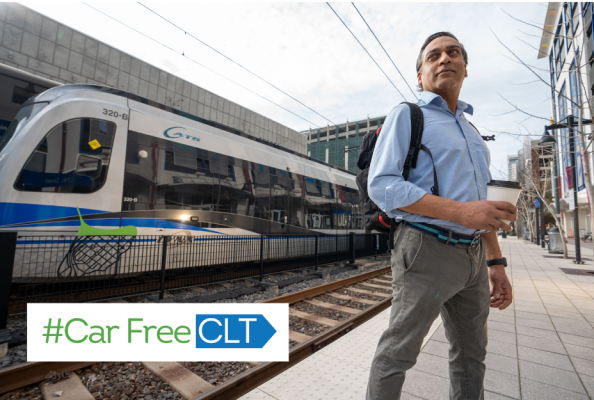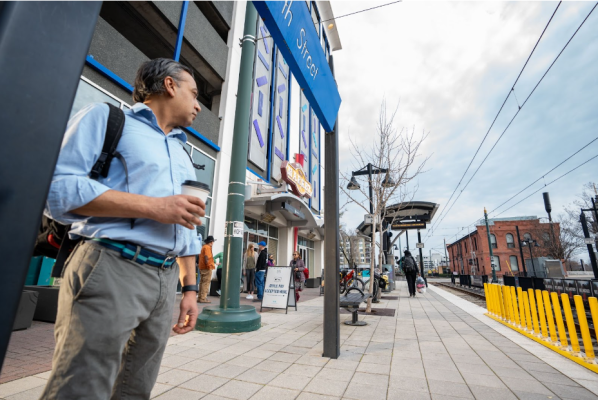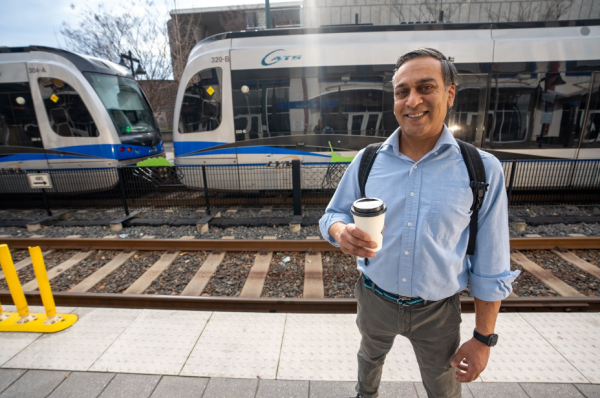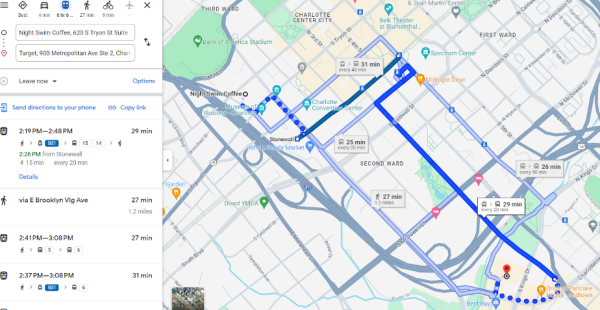Andy’s story: Making the most of a car theft

Andy Patel
Andy Patel grew up in North Carolina, having attended high school in Gastonia and college at UNC Chapel Hill. It wasn’t until he moved to Arlington, Virginia that he thought about what life could be like if he didn’t have to rely on his car. With options to carpool, ride a bike, and use public transportation, he found that living in the D.C. area opened his eyes to a more sustainable way of getting around the city.
Compared to Charlotte, living without a car in D.C. felt like a breeze.
“In D.C. It seemed like people were always trying to carpool,” Andy says. “Almost all activities like rugby practice, boating, and hiking meant friends packed together to carpool. I also knew several sets of roommates that shared a car. Here everyone drives separately. Car culture and aversion to public transportation are still very strong.”
After returning to Charlotte, Andy felt he had to once again rely on a car. Although each year he has reduced his driving, opting increasingly for bus and bike trips, he has kept a car handy for the rare occasions it has felt necessary to drive. However, that changed earlier this year, when his car was stolen from in front of his townhouse in Uptown.

“They call it a predator tow,” Andy says, and explains how in cases like these, where there are no signs of broken glass or forced entry, it is likely that a tow truck removed his car and sent it to be sold somewhere far off across the country, or overseas.
This transition from car-light to car-free has been an adjustment. For starters, Andy felt he had to turn down a job opportunity in Union County, opting, instead, to refine his job search to a smaller footprint.
“I’m more strategic about where I’m applying to. I have to take into account almost an hour outside of Uptown or the surrounding neighborhoods. That’s a big challenge.”
Another issue made more difficult without a car is grocery shopping. As an environmentalist, Andy is still weighing the pros and cons of grocery delivery services, since picking up a large bag of dog food could take an entire trip.

While there have been notable inconveniences, Andy says he’s found a way to make it work, and he’s seen many benefits, including improved health. For those who are looking to go car-light or car-free, Andy says the key to convenience is making a plan.
“I would say try something easy first, like a one stop trip to go shopping. But definitely plan it out.
Andy used Google Maps to plan his route to our interview. The app’s public transportation option comes in handy for comparing the time it would take to ride the light rail or walk, or it can be used to identify bus stops.
“The major roads have bus stops like Providence Road, Monroe Road, or South Boulevard. So you’ll be surprised to see how accessible things are if you go to Google Maps and just do one thing, like go shopping, go to the gym, or go to work.”

In the future, Andy hopes there will be more route options, reliability, improvements to the CATS App, and overall integration, so commuters can travel from point A to point B more conveniently. He also hopes for a universal transit pass, like D.C.’s Metro pass, which allows people to take the rail, bus, commuter buses, and everything in between.
“It’s like a prepaid debit card. You and/or your employer could add funds to it every month,” Andy explains. For commuters who are tired of paying for parking, having transit expenses covered by their employer could serve as a major benefit.
As our interview came to a close, Andy says he isn’t sure yet whether he will transition back to owning a car or not.
“Car-light, for sure. Car-free is to be determined. Let’s see how the next few months go.”
About #CarFreeCLT
Andy Patel started attending events hosted by Sustain Charlotte back in 2019 and has volunteered throughout the years, most recently attending an ambassador training. He appreciates that Sustain Charlotte shares his enthusiasm for sustainability and can help bring about change at a large scale.
Do you have a story to share about how you get around the greater Charlotte area without driving? Post your story to social media with the hashtag #CarFreeCLT and tag us! Your story will help us raise awareness of the challenges people face navigating our region without a car, and may also serve to inspire those who heavily rely on a car to consider more sustainable options! Thank you.
Thanks for reading!
As a nonprofit, community support is essential for us to keep doing what we do — including providing free articles like this. If you found this article helpful, please consider supporting Sustain Charlotte.
Want to stay in the loop? Subscribe to our weekly newsletter and follow us on Instagram, Facebook, and X.
